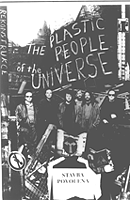

Every once in awhile a band comes along whose historical significance greatly outweighs its musical importance. The Plastic People of the Universe is a prime example. Originally formed in 1968 in what was then Czechoslovakia, the band members had no idea what their music would ultimately bring to their country.
They began as a rock cover band but soon moved onto original material. However, the start of their career coincided with the Soviet invasion of Czechoslovakia. In 1970, the Soviet Communist government began to harass the band which was forced to illegally practice and perform. During this time, both the band's membership and musical sound solidified.

It all came to an abrupt halt, however, in 1976 when a number of underground musicians, including the Plastic People, were arrested for "organized disturbance of the peace." This spearheaded the underground liberation movement which became known as Charter 77. 1989 saw the "Velvet Revolution" and Vaclav Havel's rise to power of the free Czech Republic. Unfortunately, the band had dissolved a few years earlier under the political and resulting personal stress.
In 1997, to celebrate the 20th anniversary of Charter 77, President Havel, a longtime friend and supporter of the band, asked the members to reassemble. In July 1998, the Plastic People played in New York City at Irving Plaza as part of the Intel New York Music Festival, their one and only American appearance. Until now. The band kicked off its first American tour in Boston last Tuesday and is coming to Oberlin on Wednesday.
So whose idea was it to bring this obscure Czech band to the States in the first place? Why, some Obies, of course! The Plastic People tour was arranged by Tamizdat, a non-profit organization in New York that was formed by Heather Mount, OC '93, and Matthew Covey, OC '91. Tamizdat's mission is to encourage interaction between American/Western European and Central/Eastern-European artists and audiences. It offers both publicity and booking/promotion services to Central and East-European artists, as well as providing a support system for these musicians.
Having traveled extensively and lived in the regions of interest, Mount and Covey have developed a very impressive network of artists, promoters, journalists, and many other interested and involved individuals and groups for collaboration on various projects. Covey said that one of the aims of Tamizdat is "raising people's awareness of and broadening people's horizons to the plurality of music available." He said Tamizdat hopes for the "creation of a culture where ideas flow freely between audiences and between musicians and where norms and dominant systems are questioned by the culture itself."
He went on to say that "convictions about music are politically motivated" and that "music is a cultural force, a major force for developing societies where people can think critically and develop opinions of their own. The Plastic People and what they've been through is symbolic of the extreme of this, symbolic of the struggle of musical expression as a mode toward freedom. They are especially appropriate because they're not a protest band. They are not explicitly political. You needn't be up on the barricade being the Dead Kennedys or Bob Dylan."
Nope, you just need to be the Plastic People of the Universe, a bunch of old rockers with incredible stories to tell and even more incredible songs to sing. Musical tastes aside, the entire Oberlin campus can benefit from seeing these stateside-unknown legends.
The Plastic People of the Universe will play in the 'Sco Wednesday, March 3, at 10 p.m. Tickets are $3 OCID, $6 others.
Charge! Plastic banners wave for freedom. (photo by Keith Gruchala)
Copyright © 1998, The Oberlin Review.
Volume 127, Number 15, February 26, 1999
Contact us with your comments and suggestions.